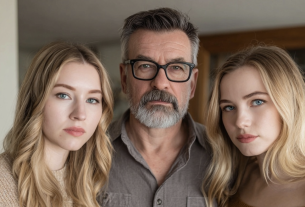— So I saved for a year for the seaside, and you, without asking, gave all our money to your brother for his construction?! What seaside?! Did you even ask me?! We’re not going anywhere! And you can go get the money back from your brother yourself, however you like!”
The words didn’t break from her lips in a scream. They came out in a steady, compressed stream of icy fury, each one like the lash of a whip. Dasha stood in the middle of the living room, holding a light, almost weightless wooden box. The very one she had opened an hour earlier with a fluttering heart, imagining how she and Anton would sit down that evening with the laptop, open the tour operator’s website, and press the cherished “Buy” button. A year. For a whole year she had denied herself small things, set aside money from every paycheck, hunted for side jobs to fill this box. She could already feel the salty wind on her skin and hear the cry of gulls.
Anton stood in the doorway, still in his work jacket. He shifted awkwardly from foot to foot, his gaze skittering around the room, clinging to anything—the pattern on the carpet, the spines of the books on the shelf—just to avoid meeting her eyes. His face displayed the whole palette of a coward caught at the scene of the crime: guilt, annoyance, and a faint hope that somehow it would all blow over.
“Dasha, why are you like this right away?” he finally squeezed out a conciliatory phrase, taking a cautious step into the room. “It’s not like I stole it. Igor needed it urgently, you understand? He’s got a problem with the foundation, the workers are waiting. He’s family—we have to help. I thought you’d understand.”
“Understand.” The word exploded in her head into a thousand shards. He thought she would understand. Understand that her dream—their first trip together in five years, their escape from this gray routine—was nothing compared to his brother’s foundation. He hadn’t even thought it necessary to let her know. He just went ahead and decided for her, for the both of them. He devalued her year of waiting with a single decision.
Dasha slowly set the empty box on the chest of drawers. Her movements became deliberate and frighteningly calm. She squared her shoulders and looked him straight in the face. There was no longer hurt or disappointment in her eyes. There was a cold, hard calculation.
“You didn’t just help your brother, Anton. You reached into our shared pocket and stole a year of my life. You stole my anticipation. You trampled the one thing that made me get out of bed in the mornings lately. You showed me that your family is Igor. And I… I’m just a convenient add-on who’s supposed to ‘be understanding.’”
He tried to object, to step closer, maybe even to hug her and sand down the sharp edges like he always did. But she put out her hand to stop him.
“Don’t come near me. I don’t want you to touch me. I don’t believe you. Not a single word. You betrayed me. Not Igor, not the bank, not whoever else. Me.”
She paused, letting the words soak into the air of the room, seep into the wallpaper, the furniture, into him.
“So. Listen carefully. There will be no vacation, obviously. And until you return to the last kopeck what you stole from our family, consider that we live like roommates. Cook for yourself, do your own laundry. I won’t touch your things anymore. Go to your brother, ask, demand, take it by force—I don’t care. It’s your problem now. You created it—you solve it.”
Dasha’s words didn’t hang in the air. They began acting immediately, spreading into the daily routine like poisonous ivy. The next morning Anton woke to the sound of the alarm on her side of the bed. She turned it off before it could ring for even a second and slipped silently out from under the blanket. A blank, cold space formed between them—a whole neutral zone. He lay there feigning sleep and listened. He heard the soft click of the bathroom door, the coffee machine starting in the kitchen. He waited for the familiar aroma of freshly brewed coffee that usually filled the apartment, but it didn’t come. The smell was barely perceptible, local, just for her.
When he finally got up, Dasha was already at the table, dressed for work. In front of her stood a single cup of coffee and a plate with her omelet. The stovetop was spotless. In the sink—one washed frying pan. She hadn’t just cooked for herself; she had erased all traces of the process, as if it had never happened. She ate in silence, looking at her phone, and didn’t raise her eyes when he walked in. He stood for a moment, waiting for any reaction—reproach, an angry glance, anything. But there was nothing. Emptiness. It was worse than shouting. He opened the fridge, took out a carton of milk, poured instant coffee into a cup. Breakfast turned out bitter and tasteless.
So went one day, then the second. The apartment turned into two invisible camps. She came home from work buying groceries only for herself. She cooked on a single burner, ate, washed her dishes, and went to the bedroom with a book or a laptop. She didn’t turn on the shared TV, didn’t ask how his day went. Her life became completely autonomous. At first Anton tried to ignore it, ordering pizza and talking loudly on the phone with friends, creating the illusion of normal life. But the silence emanating from Dasha swallowed all his sounds.
On the third day he couldn’t take it anymore. He realized she wouldn’t cool down. That this wasn’t a passing whim but a carefully built blockade. He dialed Igor’s number.
“Igor, hey. Listen, here’s the thing… We need to sort out the money. Dasha’s lost it.”
A heavy sigh came through the receiver.
“Anton, I explained it to you. The money’s in the project. I poured the foundation, bought blocks. Where am I supposed to pull it from now? You’re my brother, you should understand. I’ll pay it back when I can, don’t stress.”
“You don’t get it. She’s not just mad. It’s hell at home. She won’t talk to me. I need to tell her something, give her some kind of timeline.”
“Well, tell her I’ll start paying it back in parts in a couple of months,” Igor drawled lazily. “Okay, gotta go, I need to keep an eye on the workers. Don’t fuss, it’ll all work out.”
The beeps. “It’ll all work out.” Anton clenched the phone hard in his hand. No specifics, no real promises. He was left alone with the problem. And then, in his head, what seemed like a brilliant idea was born. Not to return the money, but to offer a replacement. Compensation. In the evening, when Dasha, as usual, walked silently from the kitchen to the bedroom, he stepped into her path.
“Dasha, wait. I get it, you’re upset. The seaside didn’t work out, it’s my fault. But I was thinking… What if we head out to Vitya’s dacha next weekend? Kebabs, the sauna, our guys will be there. We’ll relax, unwind. How about it?”
He looked at her hopefully, like a guilty puppy. He genuinely believed it was an equivalent offer. Dasha stopped and slowly raised her eyes to him. There was no anger in her gaze, only a disgusted surprise.
“Kebabs? At Vitya’s dacha? Are you seriously offering me that right now? Do you think my dream, which I worked toward for a whole year, is worth the same as you boozing with your buddies to the whine of mosquitoes? Do you respect me that little?”
She didn’t raise her voice. Each word was quiet, but struck with an open hand.
“I saved for the roar of the surf, for white sand, for two weeks when we would belong only to each other. And you offer me a grill, your friends, and mosquitoes. Take back this pathetic handout. And get out of my way.”
She walked around him the way one steps around an unpleasant obstacle on the sidewalk and disappeared into the bedroom. Anton remained standing in the hallway, utterly crushed. He hadn’t just failed to solve the problem. He had made the chasm between them even wider.
A week of icy silence turned Anton from a bewildered culprit into an embittered prisoner in his own home. He was tired of the empty pot on the stove, the demonstratively clean table, of having to go out onto the stairwell to talk to his brother. Desperation mixed with irritation pushed him to the step that seemed to him the only right and logical one. He decided that Dasha didn’t believe him, but she would have to believe Igor. Igor, with his solidity and manly straightforwardness, would be able to explain what Anton couldn’t. He would convey to her the importance of the construction, the insignificance of some seaside trip.
On Saturday morning, while Dasha sat in an armchair with a cup of tea and her tablet, scrolling through photos of other people’s happy vacations, the doorbell rang. She didn’t move. It wasn’t her door and not her guests. Anton, scurrying out of the kitchen, opened up. On the threshold stood Igor, big, self-assured, holding a box with a cheap cake—an absurd token of reconciliation.
“Come in, come in,” Anton fussed, taking his jacket.
Igor entered the living room like a host. He glanced over Dasha sitting in the armchair and, without an invitation, dropped onto the sofa, lounging with one leg thrown over the other. His look wasn’t apologetic, more appraising—like a doctor eyeing a capricious patient.
“Dasha, hi. Anton says you kicked up a fuss over nothing. I decided to stop by and talk like adults. Brought something for tea.”
Dasha slowly tore her gaze from the tablet screen. She looked at Igor, then at the cake box on the coffee table, then at her husband, who was helplessly shifting from foot to foot. Her face showed nothing but cold curiosity.
“Talk? What do you want to talk about, Igor? About how you reached into my family’s pocket?”
Igor smirked, shaking his head as if he’d heard childish nonsense.
“What pockets, Dasha, come on. We’re family. I didn’t take the money for a party; it’s for a house. A house! That’s for ages; you’ll have somewhere to come later, too. And you—this seaside, seaside… That’s dust, a fleeting pleasure. Don’t you see the difference? I’m doing this for the family, for all of us.”
He spoke calmly and condescendingly, like an adult explaining basic truths to a child. There wasn’t a hint of remorse in his words, only righteous certainty. Hearing his brother’s familiar arguments, Anton regained his footing and immediately chimed in.
“See? That’s what I told you, Dasha! Igor makes sense. It’s not just construction—it’s an investment.”
Dasha set the tablet aside. She straightened in the armchair, and suddenly her figure seemed incredibly rigid and upright.
“An investment? Fine, let’s talk investments. I invested in this ‘fleeting pleasure’ every spare penny. I took weekend side jobs while your brother rested. I denied myself new clothes while you and Anton drank beer on Fridays. That was my investment. An investment in my peace of mind, in my time with my husband. And you, Igor, came and took my dividends. Without asking. That’s not called ‘helping the family’; it’s called theft.”
The temperature in the room changed abruptly. The confident smirk slid off Igor’s face.
“Watch your language, will you? What theft? I took it from my own brother! We’ve always helped each other—you, clearly, don’t get that. Looks like you don’t have anything sacred beyond your whims.”
“What’s sacred is not sticking your nose where you’re not asked,” she snapped back. “My ‘whims’ were paid for with my labor. And they were in my box. In my and Anton’s home. And neither you nor anyone else had the right to touch them.”
She shifted her gaze to her husband, who stood there, mouth open, unable to wedge a word into the hard-edged dialogue.
“And you… You didn’t just let him do it. You brought him here, into my home, so he could explain to me why I don’t have the right to my dream. You brought a thief to justify his theft. Brilliant, Anton.”
She stood up. Not fussily, but slowly and weightily. She swept her eyes over the two brothers, frozen as if in a painting. One—brazen and self-assured. The other—pitiful and confused. In that moment they were a single whole.
“Sort out your family enterprise yourselves. One stole, the other covered for him. And take your cake with you. I don’t choke on strangers’ food, and I’m not about to choke on yours.”
Igor’s visit didn’t resolve the conflict; it set it in concrete. As soon as the front door closed behind him, Anton, red with humiliation and anger, turned to Dasha. All his awkwardness and guilt evaporated, replaced by aggressive defense. He was no longer a guilty husband; he was an offended clan member whose sacred thing had been desecrated.
“Happy now? Is this what you wanted?” He didn’t shout; he hissed, advancing on her. “You humiliated me in front of my own brother! Made him out to be a thief and me—a henpecked weakling who can’t shut his wife up!”
Dasha looked at him in silence. She saw the last embers of guilt die in his eyes and righteous fury flare up. He had made his choice. And it wasn’t in her favor.
“Your brother came into my home uninvited to teach me how to live and explain why my feelings are nonsense. And you stood there nodding along. What did you expect from me? That I’d burst into tears from tenderness and hand him the apartment keys too?”
“He’s my brother! Brother, do you understand that word?! Blood! We’re cut from the same dough! I couldn’t refuse him! And you… You measure everything by money and your whims! She needs the seaside! To hell with that seaside when my brother’s in trouble! Family isn’t trips to resorts; it’s when you’re ready to give the shirt off your back!”
He said it with such passion, with such sincere conviction, that Dasha understood—this was the end. Not just the end of a vacation. The end of everything. It wasn’t about the money. It never had been. It was about a system of values. In his world, his brother with his foundation would always matter more than she with her dream. She was merely a functional add-on to his life, whereas Igor was an inseparable part of it. She was a temporary project; he was the eternal foundation.
“The last shirt?” she asked quietly. “You didn’t give your own shirt, Anton. You gave mine. And you didn’t even ask if I’d be cold without it.”
She spoke absolutely calmly, and that calm was more frightening than any scandal. She no longer argued or proved anything. She was passing sentence. She slowly let her eyes roam over the room—their shared room, which suddenly felt alien. Her gaze stopped on the shelf above the fireplace. There, on a velvet stand, it stood. His “Secret.” A magnificent model of a three-masted frigate that Anton had been assembling for almost three years. Hundreds of tiny parts, the thinnest rigging threads, hand-carved cannons. He had spent all his free evenings with it, meditating over the blueprints. It was his pride, his personal sea, his dream of something grand and beautiful.
Without a word, Dasha walked to the fireplace. Anton watched her, not understanding her maneuver. He was still boiling from his speech and waited for counter-accusations.
She picked up the fragile hull of the ship. Gently, with both hands, like a jewel. Anton frowned.
“Put it back. Don’t touch it.”
She raised her eyes to him. There was no anger or hurt in them. Only cold, boundless indifference. She looked at him, then at the ship in her hands, then at him again. And in that look he read everything.
She didn’t hurl the frigate to the floor. She simply let her fingers open.
The sound wasn’t loud, but dry and vile. The crunch of hundreds of hours of painstaking work. Thin masts burst into splinters, the deck cracked, the elegant hull broke into several ugly pieces. Anton’s dream lay at her feet like a pile of trash.
He froze, staring at the wreckage, unable to breathe out. It was worse than if she had hit him. She hadn’t destroyed a thing. She had destroyed his time, his patience, his soul poured into that piece of wood.
Dasha looked at what she had done, then at her husband’s petrified face.
“Now we’re even. Each of us had something we were building. You made your choice.”
She turned and, without looking back, walked slowly to the bedroom, leaving him alone in the middle of the room with the ruins of their shared life by the fireplace. The door closed quietly behind her, without a slam. It wasn’t the end of a quarrel. It was the end of everything.



